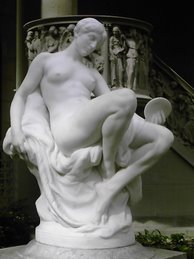By Joseph Kellard
Joannie Rochette is the Canadian figure skater who (I’m told) performed outstandingly in the Olympics last Tuesday, considering that two days before her mother, Therese -- whom she describes as her biggest fan, best friend and “the most critical person you could ever meet” -- died of a massive heart attack.
Occasionally, sports fans like me will hear a proud assertion of selfishness that is notable, and Rochette provided this when asked why she simply didn’t pack her bags and head home after he mother’s death. Rochette, who went on to skate in the women’s final and earned a bronze medal, said about her decision:
“‘I just went out there and did what my mother would have wanted me to do,’ a teary-eyed Rochette said after the woman’s final on Thursday, the first time she had spoken publicly since her mother died here [Vancouver] on Sunday. ‘I did this first of all for myself because my mother taught me to think of myself first. She always wanted me to be a strong person.’”
She thought of herself first!? How refreshingly selfish! Granted, an athlete in individualist sports such as figure skating, tennis or golf, as opposed to team sports like football, baseball or hockey, is more apt to get away with selfish statements -- especially when grieving. In team sports, however, athletes are routinely told “there’s no ‘I’ in team,” they’re praised for being a “selfless” teammates, and if they show signs of individualist behavior -- sometimes even if their actions help their team toward their common goal of winning -- they’re criticized for being “selfish.”
But winning is or should be any athlete’s primary goal, whether in individual or team sports, and his fans, whether they realize it or not, root for him to be as selfish as he can be in the pursuit of that goal. In sports, there’s no redistribution of points from the “haves” to the “have not.” As Michael Jordan replied when one of his coaches essentially accused him of selfishness because he singlehandedly took over and won a game: “There’s ‘I’ in win.”
I’m happy to hear that Rochette was strong enough to overcome her grief just enough to think of herself first, skate and win bronze. Three cheers for selfishness!
Saturday, February 27, 2010
Wednesday, February 17, 2010
Letters on Tea Party and Founders & Religion
By Joseph Kellard
Below are two letters I wrote last night and revised and emailed this morning to the editors at The New York Times. One is a response to an article about the Tea Party movement, the other a reply to an article on the role religion played in the founding of America. I must thank OActivist editors Paul Hsieh and Amit Ghate, who made some valuable suggestions and edits that improved my letters. Here's hoping they both get published. Happy reading ...!
To the Editor:
(Re: “Tea Party Lights Fuse for Rebellion on Right,” 2/16) The Tea Party movement is not about militia, libertarian or Timothy McVeigh-type anarchists. True, Tea Partiers are a hodgepodge, the best of whom rally loosely around the concept of liberty. Thus, their problem is something most Americans share: they lack a fundamental understanding of freedom.
Above all, they need intellectual leadership. Given the alarming growth of statism under the Bush-Obama administrations, both Republicans and Democrats are finally awaking to a long-developing threat. Disappointingly, the Tea Partiers' reaction has largely been on an emotional level, a sense that their individual sovereignty and rights to life, liberty and pursuit of happiness are in danger. Unfortunately, they can’t translate that sense into a much-needed coherent philosophical or political stance.
Americans must form a more intellectual platform that champions individual rights. Until then, the Tea Party will be impotent to effect any substantive or lasting change toward liberty. In short, it needs a philosophical revolution.
Joseph Kellard
East Meadow NY
To the Editor:
(Re: “How Christian Were The Founders?,” Sunday Magazine 2/14) Those who insist that America’s Founders established a nation based on Christianity drop historical context.
True, some Founders were Christians who made appeals to religion. But this was no different than their European predecessors throughout the religion-saturated Medieval and Middle ages who ruled over unfree Christian nations. What makes the Founders historically distinguishable is that they were products of the Enlightenment and Age of Reason, when religion and faith were seriously challenged, as encapsulated by Galileo’s life.
Many Founders, including Jefferson and Adams, were steeped in and heavily influenced by the works of Greek and Roman thinkers. The deists among them bravely questioned God and religion as the basis of a nation. Brooke Allen objectively lays out this intellectual revolution in her book “Moral Minority.”
The Founders knew enough to establish a nation that gave no religion any political authority, and aimed to keep it separate from the state.
Joseph Kellard
East Meadow NY
* I made some grammatical changes to the original post.
Below are two letters I wrote last night and revised and emailed this morning to the editors at The New York Times. One is a response to an article about the Tea Party movement, the other a reply to an article on the role religion played in the founding of America. I must thank OActivist editors Paul Hsieh and Amit Ghate, who made some valuable suggestions and edits that improved my letters. Here's hoping they both get published. Happy reading ...!
To the Editor:
(Re: “Tea Party Lights Fuse for Rebellion on Right,” 2/16) The Tea Party movement is not about militia, libertarian or Timothy McVeigh-type anarchists. True, Tea Partiers are a hodgepodge, the best of whom rally loosely around the concept of liberty. Thus, their problem is something most Americans share: they lack a fundamental understanding of freedom.
Above all, they need intellectual leadership. Given the alarming growth of statism under the Bush-Obama administrations, both Republicans and Democrats are finally awaking to a long-developing threat. Disappointingly, the Tea Partiers' reaction has largely been on an emotional level, a sense that their individual sovereignty and rights to life, liberty and pursuit of happiness are in danger. Unfortunately, they can’t translate that sense into a much-needed coherent philosophical or political stance.
Americans must form a more intellectual platform that champions individual rights. Until then, the Tea Party will be impotent to effect any substantive or lasting change toward liberty. In short, it needs a philosophical revolution.
Joseph Kellard
East Meadow NY
To the Editor:
(Re: “How Christian Were The Founders?,” Sunday Magazine 2/14) Those who insist that America’s Founders established a nation based on Christianity drop historical context.
True, some Founders were Christians who made appeals to religion. But this was no different than their European predecessors throughout the religion-saturated Medieval and Middle ages who ruled over unfree Christian nations. What makes the Founders historically distinguishable is that they were products of the Enlightenment and Age of Reason, when religion and faith were seriously challenged, as encapsulated by Galileo’s life.
Many Founders, including Jefferson and Adams, were steeped in and heavily influenced by the works of Greek and Roman thinkers. The deists among them bravely questioned God and religion as the basis of a nation. Brooke Allen objectively lays out this intellectual revolution in her book “Moral Minority.”
The Founders knew enough to establish a nation that gave no religion any political authority, and aimed to keep it separate from the state.
Joseph Kellard
East Meadow NY
* I made some grammatical changes to the original post.
Sunday, February 14, 2010
Channeling Ted Kaczynski
By Joseph Kellard
If you’re motivated to read, firsthand, what passes for intellectual leadership in America today, then I have a telling essay for you.
Before I first discovered Ayn Rand in the early 1990s, I used to read regularly “The Best American Essays,” an annual anthology of magazine essays. Once I started to read Miss Rand heavily, I lost interest in this publication — and now I know why. Recently I decided to buy the 2009 anthology, curious to see what it was that I once enjoyed about this series several years ago. Well, I’m six essays in (out of 22) and while none are enlightening, some are downright dreadful. The topper, so far, is an essay titled “Faustian Economics,” by Wendell Berry, a novelist, poet and essayist, which was originally published in Harper’s.
The essay perfectly exemplifies the “ideas” motivating the environmental movement. It centers on man’s alleged blindness to “limits,” both his and Earth’s. Rather than provide excerpts from this essay, I’d rather share some of the notes I took while reading it, which I’ve fleshed out here for clarity:
* The author makes no attempt to ground many of his claims. A rationalist?
* He primarily uses “limits” as a packaged deal to decry all that he hates about Technological/Industrial Man.
* He pushes environmentalism’s limited-resources orthodoxy: we’re all just rapacious consumers who, when we do produce, are just using up more and more of Earth’s resources that will inevitably run out…someday.
* He appeals to religion to give his environmentalist claims moral weight — primarily to condemn selfishness and greed.
* He essentially takes the position that too much knowledge is bad — we should know that there are limits and mistakenly believe we can be omniscient.
* Capitalism is a zerosum economic system, consequently money is a fixed (limited) pie and so the haves leave nothing for the have-nots.
* Those who don’t want to accept limits are those who don’t want to sacrifice to “anything whatever.”
* Men aren’t worth anything and don’t amount to anything — even if each man had two lives.
You may reach different, more insightful conclusions than I did. But, nevertheless, this is as near a naked hatred of selfishness, capitalism and (industrial-technology) man as you’ll find in a mainstream (supposed) intellectual publication.
* I made some minor grammatical changes to the original post. ~ JK
If you’re motivated to read, firsthand, what passes for intellectual leadership in America today, then I have a telling essay for you.
Before I first discovered Ayn Rand in the early 1990s, I used to read regularly “The Best American Essays,” an annual anthology of magazine essays. Once I started to read Miss Rand heavily, I lost interest in this publication — and now I know why. Recently I decided to buy the 2009 anthology, curious to see what it was that I once enjoyed about this series several years ago. Well, I’m six essays in (out of 22) and while none are enlightening, some are downright dreadful. The topper, so far, is an essay titled “Faustian Economics,” by Wendell Berry, a novelist, poet and essayist, which was originally published in Harper’s.
The essay perfectly exemplifies the “ideas” motivating the environmental movement. It centers on man’s alleged blindness to “limits,” both his and Earth’s. Rather than provide excerpts from this essay, I’d rather share some of the notes I took while reading it, which I’ve fleshed out here for clarity:
* The author makes no attempt to ground many of his claims. A rationalist?
* He primarily uses “limits” as a packaged deal to decry all that he hates about Technological/Industrial Man.
* He pushes environmentalism’s limited-resources orthodoxy: we’re all just rapacious consumers who, when we do produce, are just using up more and more of Earth’s resources that will inevitably run out…someday.
* He appeals to religion to give his environmentalist claims moral weight — primarily to condemn selfishness and greed.
* He essentially takes the position that too much knowledge is bad — we should know that there are limits and mistakenly believe we can be omniscient.
* Capitalism is a zerosum economic system, consequently money is a fixed (limited) pie and so the haves leave nothing for the have-nots.
* Those who don’t want to accept limits are those who don’t want to sacrifice to “anything whatever.”
* Men aren’t worth anything and don’t amount to anything — even if each man had two lives.
You may reach different, more insightful conclusions than I did. But, nevertheless, this is as near a naked hatred of selfishness, capitalism and (industrial-technology) man as you’ll find in a mainstream (supposed) intellectual publication.
* I made some minor grammatical changes to the original post. ~ JK
Friday, February 12, 2010
Environmentalists’ Claims Continue to Melt
By Joseph Kellard
I learned from an Objectivist blogger that the Utah House of Representatives just passed a resolution that: "implies climate change science is a conspiracy, and urges the EPA to stop all carbon dioxide reduction policies and programs. Among other things, the resolution claims there is ‘a well organized and ongoing effort to manipulate global temperature data in order to produce a global warming outcome.’"
The Heartland Institute posted a brief report about the bill here, which leads to a link to a fuller report here.
You can also read the bill in full.
As the blogger pointed out, the government should have no involvement in scientific matters, including catastrophic global warming. But it's nevertheless a telling sign that a legislative body is actually coming out and voting against this scam that has become orthodoxy to many Americans and others. It's telling us that environmentalists' claims on this issue are continuing to melt.
I learned from an Objectivist blogger that the Utah House of Representatives just passed a resolution that: "implies climate change science is a conspiracy, and urges the EPA to stop all carbon dioxide reduction policies and programs. Among other things, the resolution claims there is ‘a well organized and ongoing effort to manipulate global temperature data in order to produce a global warming outcome.’"
The Heartland Institute posted a brief report about the bill here, which leads to a link to a fuller report here.
You can also read the bill in full.
As the blogger pointed out, the government should have no involvement in scientific matters, including catastrophic global warming. But it's nevertheless a telling sign that a legislative body is actually coming out and voting against this scam that has become orthodoxy to many Americans and others. It's telling us that environmentalists' claims on this issue are continuing to melt.
Friday, February 5, 2010
Shooing Away Potential Fountainhead Fans
By Joseph Kellard
I wrote and sent the following reply to a so-called book reviewer of "The Fountainhead" -- whose denigrating comments about the novel were posted on the website of Tehelka, described as India's Independent weekly news magazine.
To Samrat Chakrabarti:
In an effort to get your readers not to read certain books, among them my favorite novel “The Fountainhead," you write:
“Ayn Rand Memo to the young Indian — Ayn Rand is not a philosopher and The Fountainhead is not the philosophical El-dorado, in fact we are not sure there is one. People are not made of cardboard, a good argument needs rigour and philosophy begins with an acknowledgement both of the complex world we live in and the paradoxes of the human condition. Rape is not the same as passion, ambition is not the measure of man and an aggressive, no-holds-barred individualism as a personal philosophy is particularly attractive during years of heightened hormonal confusion.”
First, Objectivism offers inquiring minds a comprehensive philosophy, from metaphysics to ethics to esthetics. Your readers should read "Objectivism: The Philosophy of Ayn Rand," by Leonard Peikoff, to fully understand the absurdity of your claim. The discerning reader will understand why, when they come across life’s complexities and contradictions, that there can be and are answers and that there is, as Ayn Rand called Objectivism, "a philosophy for living on earth."
Moreover, the characters in her novels are anything but cardboard – Miss Rand sheds the deadening, mind-numbing details that naturalist writers employ in their novels to supposedly make them more "realistic," and instead focuses on the essentials aspects of the particular type of human being that she wanted to portrait -- and in the process her novels made some very perceptive and even innovative observations, such as the second-handedness of Peter Keating.
As to the alleged "rape" scene in The Fountainhead, you should point your readers to an excellent essay, "Understanding the 'rape' Scene in The Fountainhead," by Andrew Bernstein, in "Essays on Ayn Rand's The Fountainhead,” which explains why Roark’s first sexual encounter with Dominique was anything but rape.
Lastly, I’ll address just the most important of your parting slights. It’s a slight that is best encapsulated by the person who read Miss Rand’s books in their youth and says: "I used to like Ayn Rand, but then I grew up." No, you gave up!
"The Fountainhead" was the first book that I ever read by Ayn Rand, back in my mid-20s, when I used to read a slew of novels by naturalist writers. By the end of the novel I was totally captivated by Roark -- and Ayn Rand and, later, her philosophy of Objectivism. I went on to read all of her books.
I can confidently say that reading the “The Fountainhead” started the long, roller-coaster ride process of changing around my troubled life for the better when I was still young. That’s primarily due to the fact that Miss Rand wasn’t a journalistic, naturalistic-type writer, but rather a romantic realist who created heroic characters as they could be and ought to be. If reading “The Fountainhead” had that profound impact on me, then it can do the same for the very readers you’re trying to shoo away from this great, philosophic, life-changing novel.
~ Joseph Kellard
East Meadow NY
I wrote and sent the following reply to a so-called book reviewer of "The Fountainhead" -- whose denigrating comments about the novel were posted on the website of Tehelka, described as India's Independent weekly news magazine.
To Samrat Chakrabarti:
In an effort to get your readers not to read certain books, among them my favorite novel “The Fountainhead," you write:
“Ayn Rand Memo to the young Indian — Ayn Rand is not a philosopher and The Fountainhead is not the philosophical El-dorado, in fact we are not sure there is one. People are not made of cardboard, a good argument needs rigour and philosophy begins with an acknowledgement both of the complex world we live in and the paradoxes of the human condition. Rape is not the same as passion, ambition is not the measure of man and an aggressive, no-holds-barred individualism as a personal philosophy is particularly attractive during years of heightened hormonal confusion.”
First, Objectivism offers inquiring minds a comprehensive philosophy, from metaphysics to ethics to esthetics. Your readers should read "Objectivism: The Philosophy of Ayn Rand," by Leonard Peikoff, to fully understand the absurdity of your claim. The discerning reader will understand why, when they come across life’s complexities and contradictions, that there can be and are answers and that there is, as Ayn Rand called Objectivism, "a philosophy for living on earth."
Moreover, the characters in her novels are anything but cardboard – Miss Rand sheds the deadening, mind-numbing details that naturalist writers employ in their novels to supposedly make them more "realistic," and instead focuses on the essentials aspects of the particular type of human being that she wanted to portrait -- and in the process her novels made some very perceptive and even innovative observations, such as the second-handedness of Peter Keating.
As to the alleged "rape" scene in The Fountainhead, you should point your readers to an excellent essay, "Understanding the 'rape' Scene in The Fountainhead," by Andrew Bernstein, in "Essays on Ayn Rand's The Fountainhead,” which explains why Roark’s first sexual encounter with Dominique was anything but rape.
Lastly, I’ll address just the most important of your parting slights. It’s a slight that is best encapsulated by the person who read Miss Rand’s books in their youth and says: "I used to like Ayn Rand, but then I grew up." No, you gave up!
"The Fountainhead" was the first book that I ever read by Ayn Rand, back in my mid-20s, when I used to read a slew of novels by naturalist writers. By the end of the novel I was totally captivated by Roark -- and Ayn Rand and, later, her philosophy of Objectivism. I went on to read all of her books.
I can confidently say that reading the “The Fountainhead” started the long, roller-coaster ride process of changing around my troubled life for the better when I was still young. That’s primarily due to the fact that Miss Rand wasn’t a journalistic, naturalistic-type writer, but rather a romantic realist who created heroic characters as they could be and ought to be. If reading “The Fountainhead” had that profound impact on me, then it can do the same for the very readers you’re trying to shoo away from this great, philosophic, life-changing novel.
~ Joseph Kellard
East Meadow NY
Subscribe to:
Posts (Atom)































+-+June+2009.jpg)










